Are Oranges Toxic to Cats: Uncovering the Facts
When contemplating the safety of various foods for pets, cat owners may wonder about the risks associated with feeding their feline friends oranges. Oranges are a popular fruit known for their vitamin C content and refreshing taste, but for cats, the appeal and effects of this citrus fruit are quite different. While the flesh of an orange is not considered highly toxic to cats, it's important to understand the potential health effects that can arise from feeding oranges to them.
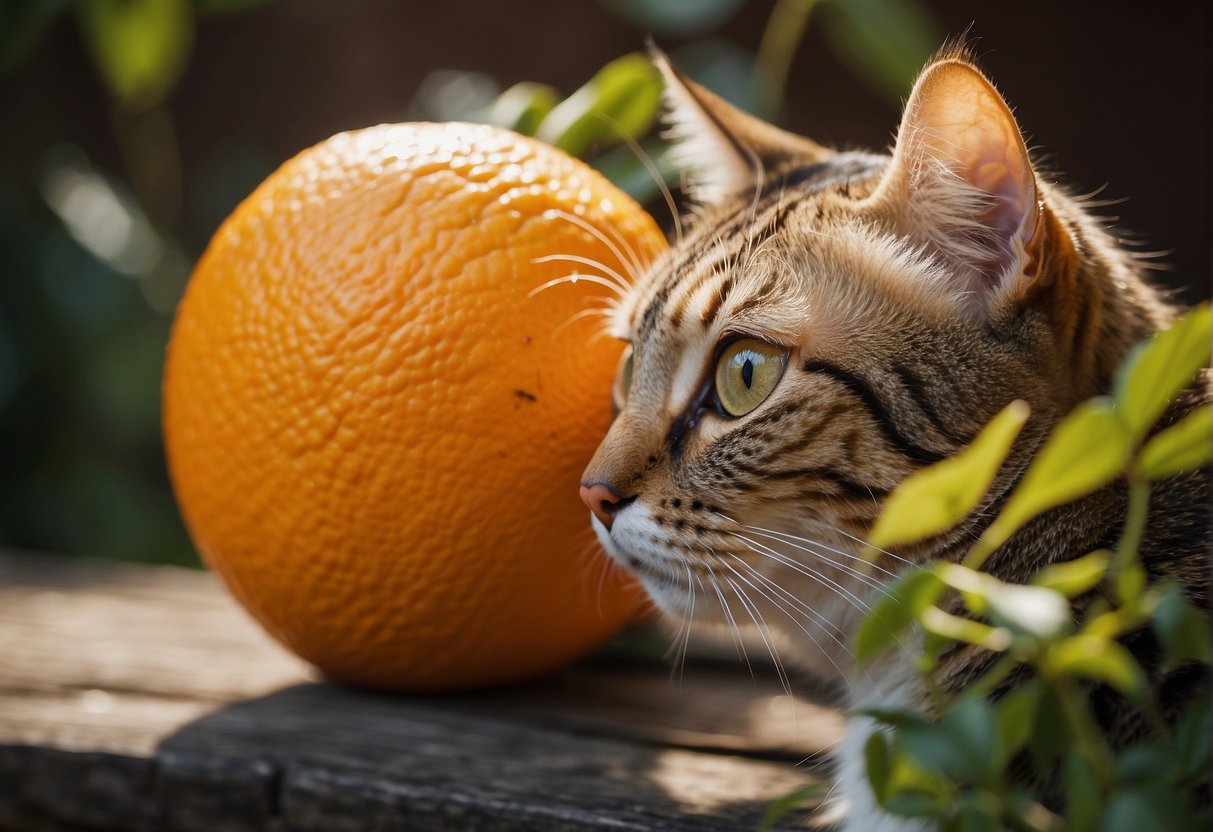
Cats are obligate carnivores, which means their diet should be primarily composed of meat. Their bodies are not designed to digest large amounts of fruit, and oranges contain substances that can be harmful to them in large quantities. Furthermore, cats may be repelled by the strong scent of citrus and therefore may naturally avoid consuming oranges. It is important to be aware of the ingredients and foods cats consume to ensure their diet is safe and appropriate for their specific digestive needs.
Key Takeaways
- Oranges are not highly toxic to cats, but can have adverse health effects.
- Cats are mainly meat-eaters and their digestive systems are not suited for oranges.
- Understanding and providing a safe diet is crucial for feline health.
Are Oranges Harmful to Cats?
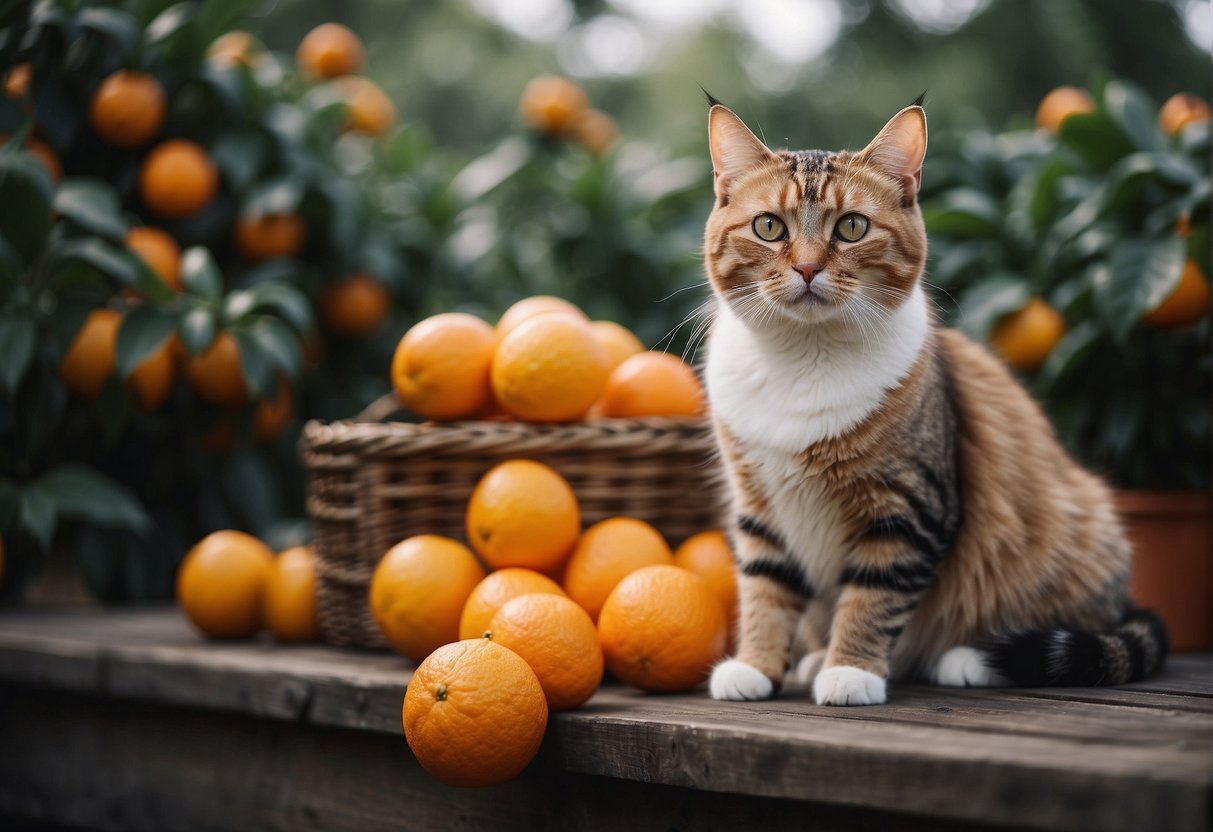
Oranges contain compounds that can be harmful to your cat. If you're a cat owner, understanding the potential risks is crucial for your pet's health and safety.
Citrus Toxicity and Feline Health
When you introduce any citrus fruit to your cat, you're potentially exposing them to toxic compounds. The most notable toxins in oranges are psoralens, limonene, and linalool, which are all found in the essential oils and are toxic to cats in varying degrees. Psoralens, in particular, can lead to photo-induced toxicity, where exposure to sunlight after ingestion can exacerbate the problem.
Here are some general symptoms associated with citrus poisoning in cats:
- Vomiting
- Diarrhea
- Depression
- Weakness
- Drooling
If you observe these signs after your cat has ingested oranges or been around orange peels, consult a veterinarian immediately.
Identifying Toxic Compounds in Oranges
D-limonene is a compound found in the peel of oranges. It is a natural insecticide and works well against pests like fleas. However, it can have a toxic effect on cats if they come into contact with it. D-limonene exposures most commonly occur when cats are treated with flea products made for dogs or when they lick the oil from their fur.
Citric acid is another component found in the flesh of oranges, which can cause digestive upset in cats. While a small lick might not result in severe toxicity, it's best to keep your cat away from oranges to avoid potential health issues.
Remember, while some fruits are a healthy snack for humans, oranges are not recommended for feline friends due to their toxicity risks. Always keep oranges and orange peels out of reach of your cat.
Potential Health Effects of Oranges on Cats
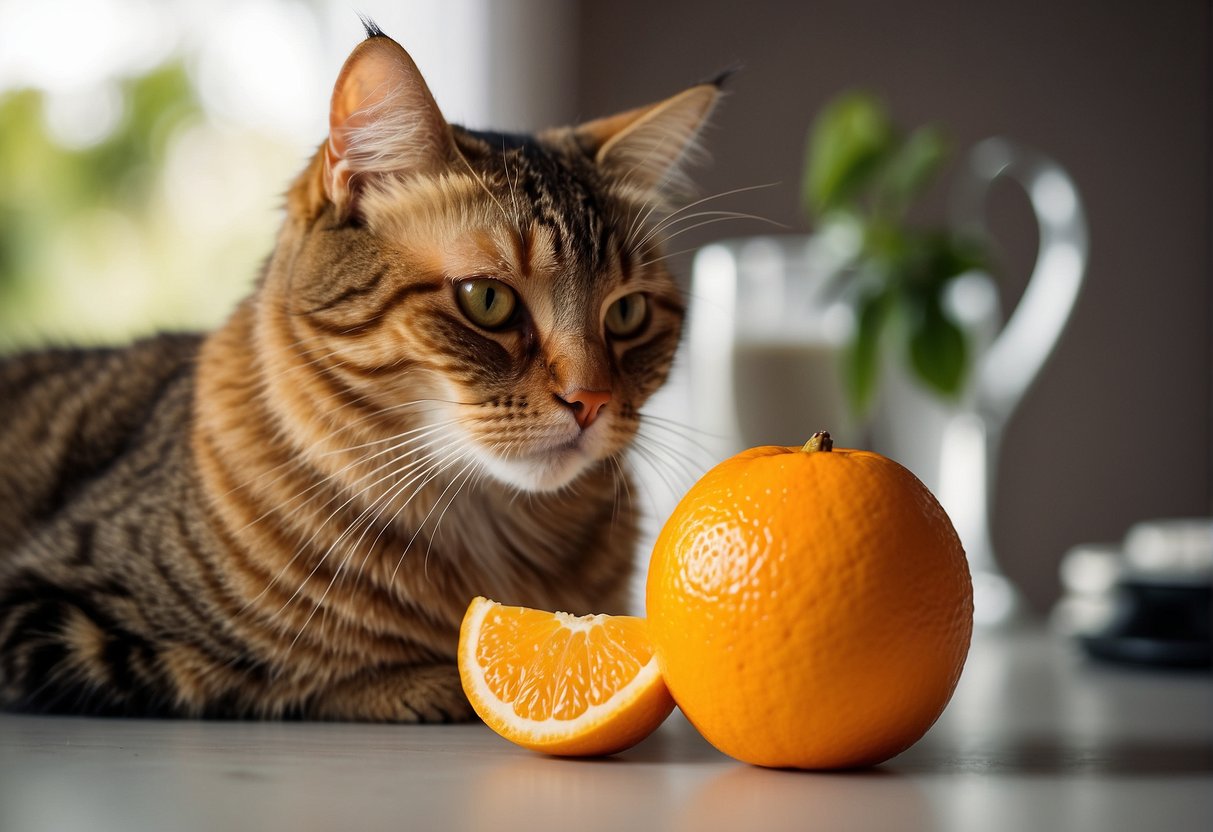
When your cat consumes oranges, they may experience adverse health effects due to the essential oils and psoralens found in the fruit. These substances can be toxic to felines if ingested.
Physical Symptoms of Ingestion
If your cat ingests orange, you might notice several physical symptoms which can include:
- Skin irritation: Contact with orange peel, leaves, or the actual fruit can irritate your cat's skin.
- Photosensitivity: Components in oranges may cause increased sensitivity to light, leading to skin discomfort under sun exposure.
- Gastrointestinal upset: Oranges contain sugars that cats cannot digest well, which can lead to an upset stomach, vomiting, or diarrhea.
- Lethargy and depression: A reaction to the orange may make your cat unusually tired or appear withdrawn.
Long-Term Health Risks
While the occasional small nibble may not be harmful, significant ingestion of oranges can lead to more serious health risks:
- Weight changes: Regular ingestion of the sugars in oranges can contribute to unhealthy weight gain due to the excess calories.
- Seizures: In severe cases, the toxic effects of oranges can potentially lead to seizures.
- Dehydration: If your cat experiences severe cases of diarrhea or vomiting, it's at risk for dehydration.
Monitor for these symptoms if you suspect your cat has eaten any part of an orange, and seek veterinary care to mitigate the risks.
Safe Dietary Practices for Cats
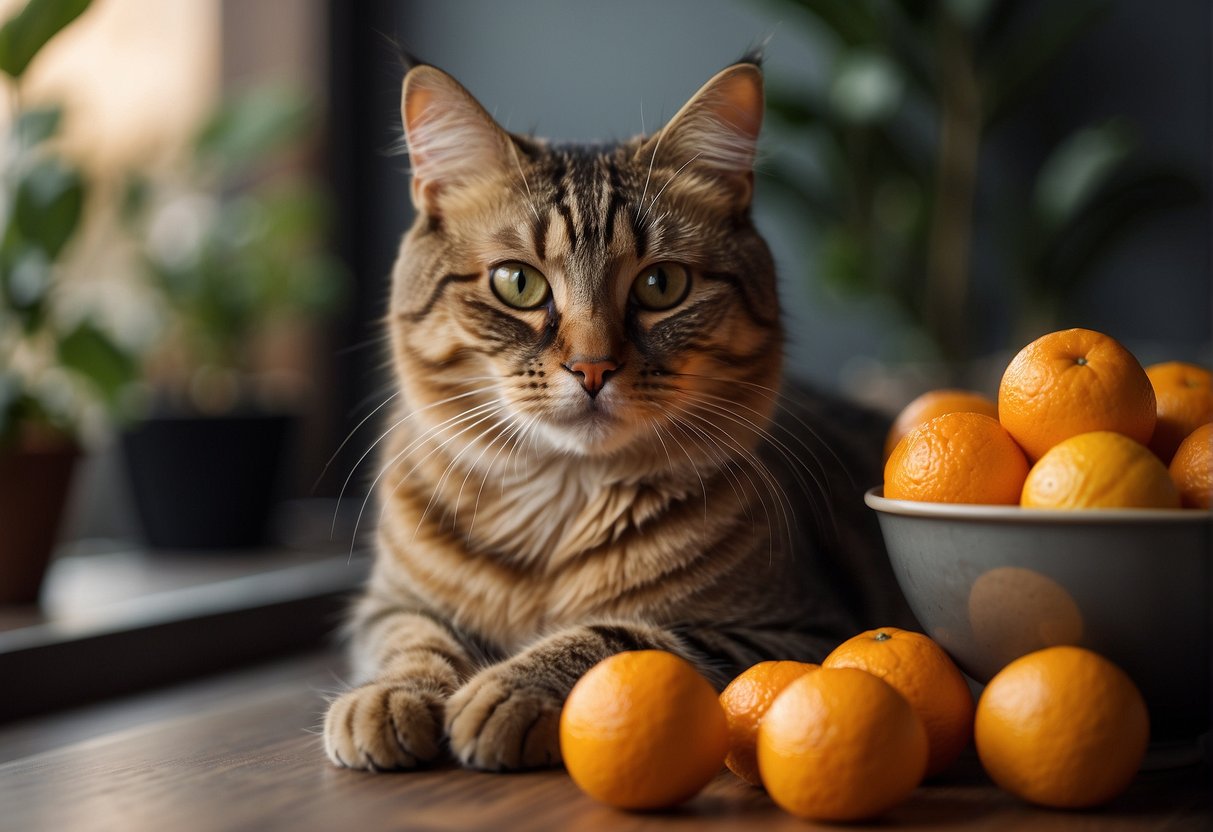
When planning your cat's diet, it's essential to recognize that while some fruits can be a harmless treat, moderation is key. Cats are obligate carnivores, which means their nutritional needs are primarily met through meat. However, knowing which fruits they can enjoy safely and understanding the appropriate role of a veterinarian can ensure your cat maintains a healthy diet.
Fruits Cats Can Safely Enjoy
Your cat may enjoy certain fruits in small quantities as an occasional treat. The following fruits are generally considered safe for cats:
- Apples (seeds removed, as they can be toxic)
- Blueberries
- Strawberries
- Seedless Watermelon
While fruits like bananas and mangoes are not toxic, they are higher in sugar and should be given sparingly. It's important to avoid certain fruits such as grapes and raisins, which are known to be toxic to cats. Always wash fruit thoroughly to remove pesticides and cut them into small, manageable pieces to prevent choking.
Remember, although fruits like blackberries and raspberries are safe, they offer no nutritional benefits for your cat, as they require specific nutrients found in meat. Also, cats produce their own Vitamin C, so they don't need it supplemented through fruits.
The Role of a Veterinarian in Cat Diet
Consulting with a veterinarian is crucial for establishing and maintaining a safe and healthy diet for your cat. They can provide guidance on:
- Commercial Cat Food: Advice on selecting a commercial cat food that meets all the nutritional requirements for your cat's life stage.
- Dietary Supplements: Assessment of whether your cat requires any additional nutrients or if certain human foods may be beneficial in moderation.
- Health Check-ups: Regular health check-ups to ensure your cat's diet is supporting their overall well-being.
A vet will help you understand the balance of feeding practices and the importance of a diet predominantly made of commercial cat food designed specifically for feline health. They can also address any concerns about introducing human foods into their diet and advise on what constitutes a truly occasional treat.
Preventative Measures and Treatments
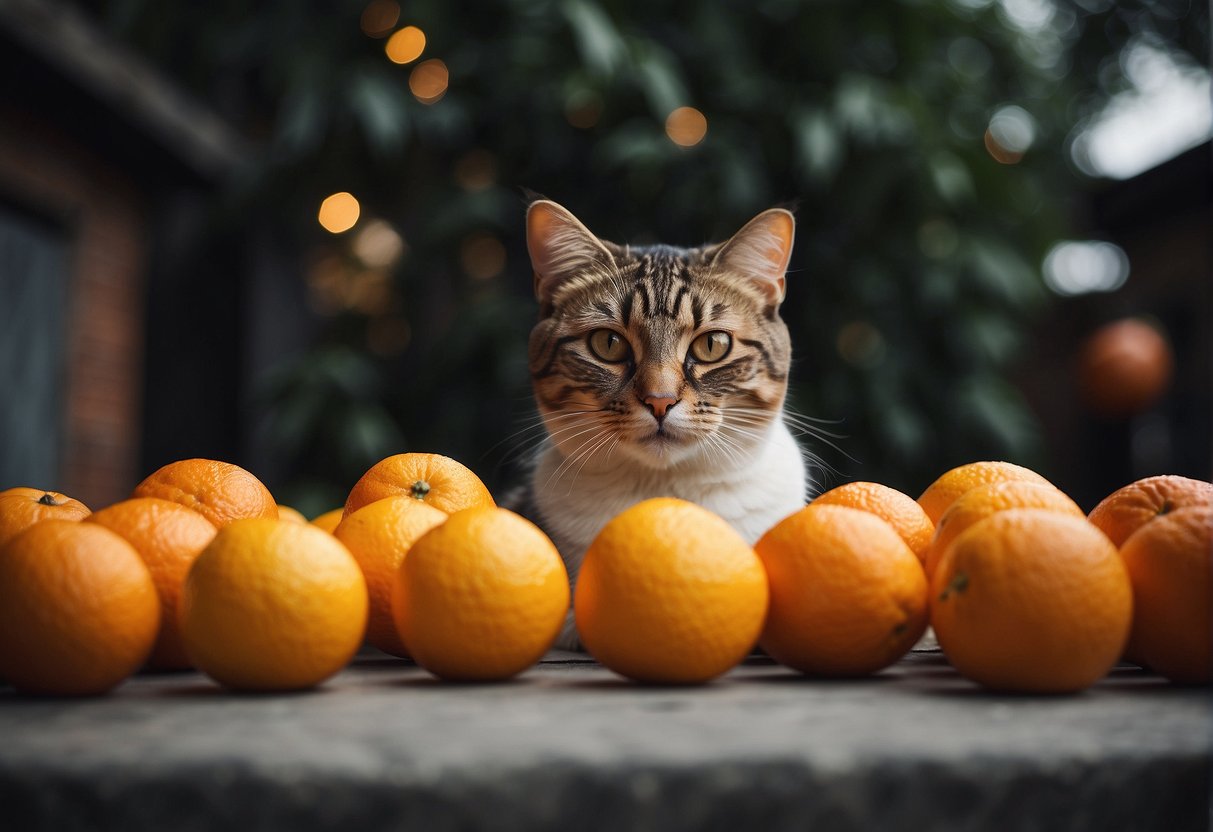
When your cat is exposed to oranges or other citrus fruits, immediate action and preventive strategies are crucial to protect their health. Citrus fruits contain compounds that can be toxic to cats and can lead to citrus poisoning.
Immediate Steps after Citrus Ingestion
If you suspect your cat has ingested orange peel, essential oils, or any part of an orange, it's vital to act swiftly. Remove any remaining citrus material from your cat's reach to prevent further ingestion. Do not induce vomiting or administer any home remedies, such as hydrogen peroxide, without direct instructions from a vet. Contact your vet immediately or reach out to the ASPCA Animal Poison Control Center for guidance. Your vet may instruct you to administer a hydrogen peroxide solution to induce vomiting, or they might recommend bringing your cat in for treatment, which can include administering activated charcoal to absorb toxins.
Protective Steps to Prevent Ingestion
Prevention is key in protecting your cat from the dangers of citrus poisoning. Use these strategies to keep citrus fruits, peels, leaves, and essential oils out of your cat's reach:
- Aversion: Cats dislike the smell of citrus. Utilize the natural scent of oranges as a cat repellent by leaving peels in areas where you want to discourage your cat from exploring.
- Secure Storage: Always store essential oils and citrus products in secure cabinets.
- Cat-Safe Products: Choose cat repellents that are specifically designed for pets. Be cautious of products exempted from EPA regulations, which might contain essential oils or other substances that can be toxic to cats.
- Avoid Toxic Plants: Some household plants, including those from the citrus family, can be harmful. Keep these plants out of your home, or make sure they are thoroughly out of your cat’s reach.
Implementing these steps can provide an effective safety net against the potential risks of citrus exposure to cats. If at any point you are unsure, it is best to consult with your vet for a professional opinion on preventatives and treatments.
Frequently Asked Questions
When it comes to the health and safety of your cat, knowledge about potential toxins can be crucial. This section addresses key concerns surrounding the effects of citrus fruits, specifically oranges, on feline health.
What effects do citrus fruits have on feline health?
Citrus fruits, including oranges, contain compounds that can be toxic to cats. These fruits can cause irritation or a more severe reaction if ingested.
Are the peels of oranges harmful if ingested by cats?
The peels of oranges are particularly troublesome for cats. Not only are they difficult to digest, but they also contain concentrated essential oils and citrus compounds that can be more toxic than the fruit itself.
What can happen if a cat licks or consumes an orange?
If your cat licks or consumes an orange, they may exhibit symptoms like drooling, vomiting, or diarrhea. Ingestion can lead to a more serious reaction or toxicity, especially if they consume large quantities.
Can the aroma of oranges negatively impact a cat's well-being?
The strong aroma of oranges can be overwhelming for cats and potentially lead to discomfort or stress. While it generally won't cause toxicity, it's best to keep your cat away from strong citrus scents.
Is there any toxicity risk to cats from fruits similar to oranges, such as lemons?
Fruits similar to oranges, such as lemons, also pose a toxicity risk to cats. These citrus fruits contain substances that can lead to adverse health effects if cats are exposed to them.
Do cats have an aversion or attraction to the scent of citrus fruits?
Cats typically have an aversion to the scent of citrus fruits. This strong dislike can sometimes be advantageous if you're trying to deter them from certain areas of your home. However, it's important to ensure that this method of deterrence doesn't cause your cat undue stress.





Comments